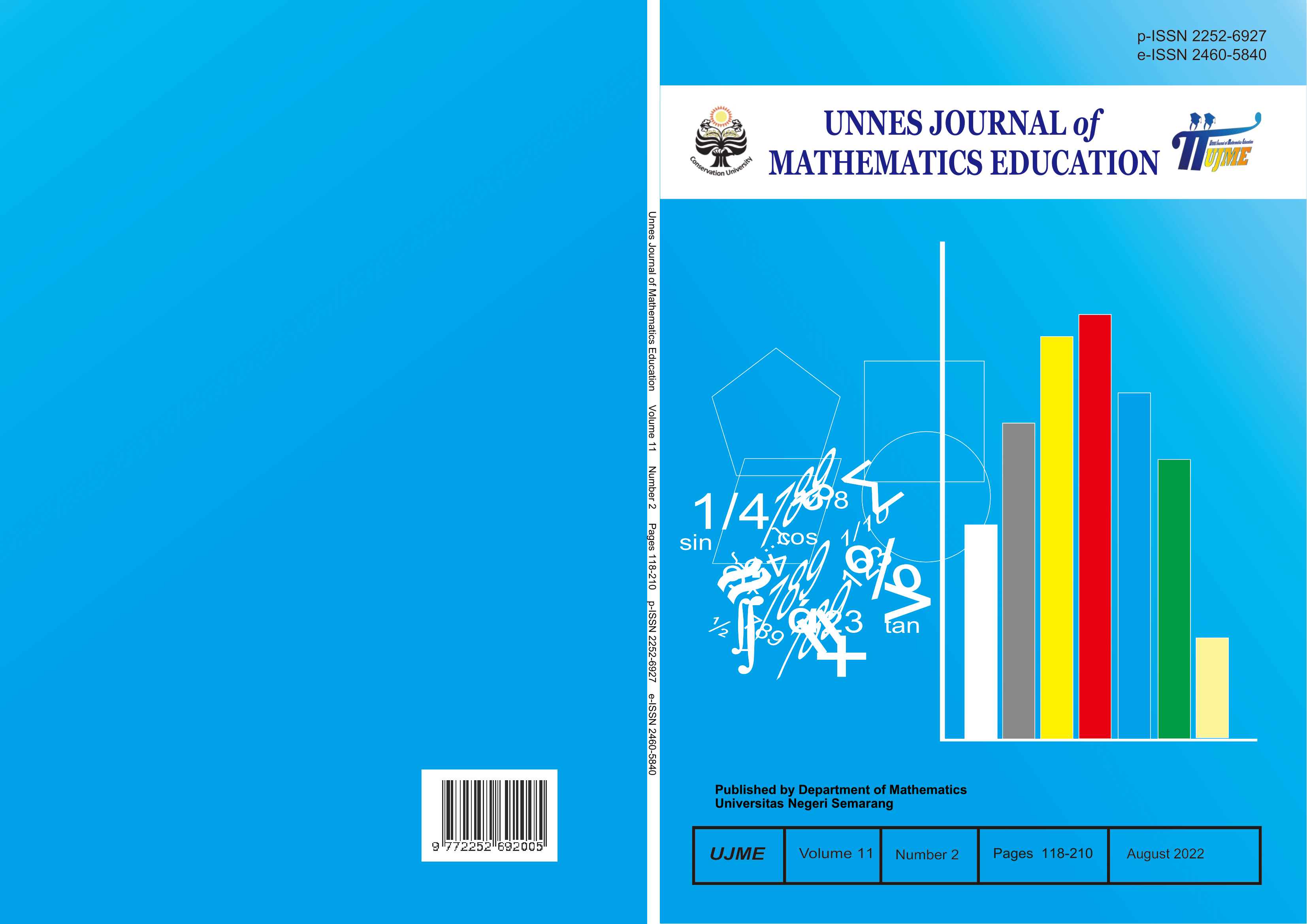Analysis of Student Errors in Solving Mathematical Literacy Problems Based on the Components of the Mathematical Literacy Process
##plugins.themes.academic_pro.article.main##
Abstract
The low PISA Mathematics score of Indonesia was a strong background in this study. The results of the 2018 Mathematics PISA Indonesia scored 371, lower than the 2015 score of 386. This study is a qualitative study that aims to describe student errors in solving mathematical literacy problems on linear program material. The methods used documentation in the form of answer sheets, observations, and interviews. The validity of the data was obtained by using triangulation techniques from the three methods used. The research sample was taken by 25 students of class X SMA Negeri 4 Purworejo. The results of the research include: (1) as many as 20 students, or 80% of students, have not been able to formulate problems mathematically. Students have not been able to make an example of the problem correctly. (2) as many as 23 students, or 92% of students, have not been able to use mathematical concepts and, have not been able to write mathematical symbols (facts) correctly, have not been able to solve problems with correct mathematical principles and procedures. (3) as many as 22 students, or 88% of students, have not been able to make conclusions and evaluate the problems given. From these results, it can be said that 80% or more of students have not been able to solve math problems from the lowest stages of the literacy process.
##plugins.themes.academic_pro.article.details##
References
Brewley, D. N. (2012). College mathematics literacy workers of Young People's Project Chicago: A community of practice. Journal of Urban Mathematics Education, 5(1), 44-54.
Dinni, H. N. (2018, February). HOTS (High Order Thinking Skills) dan kaitannya dengan kemampuan literasi matematika. In PRISMA, Prosiding Seminar Nasional Matematika (Vol. 1, pp. 170-176).
Draper, R. J. (2002). School mathematics reform, constructivism, and literacy: A case for literacy instruction in the reform-oriented math classroom. Journal of Adolescent & Adult Literacy, 45(6), 520-529.
Farida, N. (2015). Analisis kesalahan siswa SMP kelas VIII dalam menyelesaikan masalah soal cerita matematika. AKSIOMA: Jurnal Program Studi Pendidikan Matematika, 4(2).
Mahdiansyah, M., & Rahmawati, R. (2014). Literasi matematika siswa pendidikan menengah: analisis menggunakan desain tes internasional dengan konteks Indonesia. Jurnal Pendidikan Dan Kebudayaan, 20(4), 452-469.
Nurianti, E., Halini, & Ijudin, R. (2015). Analisis Kesalahan Siswa dalam menyelesaaikan soal materi pecahan bentuk aljabar di kelas VII SMP. Jurnal Pendidikan dan pembelajaran khatulistiwa, 4(9).
OECD. (2010). The Programme for International Student Assessment (PISA). http://www.oecd.org/dataoecd/61/15/46241909.pdf
OECD. (2019). Multilingual Summaries PISA 2018 Results (Volume 1) What Students Know and Can Do. Summary in Indonesian.
Ojose, B. (2011). Mathematics literacy: Are we able to put the mathematics we learn into everyday use? Journal of mathematics education, 4(1), 89-100.
Pangesti, F. T. P. (2018). Menumbuhkembangkan literasi numerasi pada pembelajaran matematika dengan soal HOTS. Indonesian Digital Journal of Mathematics and Education, 5(9), 566-575.
Sofianingsih, A.&Kusmanto, B. (2021). Analisis Kesalahan Dalam Menyelesaikan Soal Matematika Pada Siswa Kelas VII SMP N 1 Kretek. In Prosiding Seminar Nasional Etnomatnesia.
Sugiyono. (2012). Metode Penelitian Pendidikan Pendekatan Kuantitatif, Kualitatif, dan R&D. Bandung: Alfabeta.
Suryapuspitarini, B. K., Wardono, W., & Kartono, K. (2018, February). Analisis soal-soal matematika tipe Higher Order Thinking Skill (HOTS) pada kurikulum 2013 untuk mendukung kemampuan literasi siswa. In PRISMA, Prosiding Seminar Nasional Matematika (Vol. 1, pp. 876-884).
Wong, P. K. (2005). Mathematical literacy of Hong Kong’s 15-year-old students in PISA. Education Journal, 32(1), 91-120.
